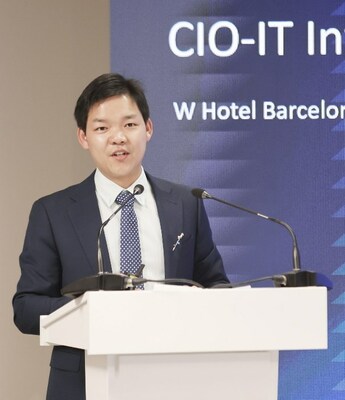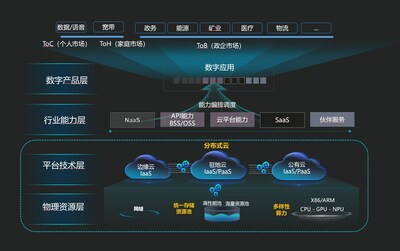BARCELONA, Spain, March 2, 2023 /PRNewswire/ -- At Huawei's IT Infrastructure Transformation Forum during MWC Barcelona 2023, David Chen, Director of Huawei Carrier IT Marketing and Solution Sales, launched the future-oriented target reference architecture for carrier IT infrastructure. Through collaboration between communication technology (CT) and information technology (IT), online and on-premises, and software and hardware, the architecture supports the evolution of Huawei and its customers from CT to ICT. Chen stated that intelligent, reliable, efficient, and collaborative IT infrastructure can expand the scope for the monetization of operators' network infrastructure, accelerate their digital transformation, and facilitate their growth.
According to third-party research, global operators' primary services grew by about 4% from 2021 to 2022, while innovative services like IoT, cloud, and smart home grew by over 10%. Telecom operators are presented with new opportunities in the wave of digital transformation. Booming digital services are driving telecom operators to rapidly move into the new field of integrated digital services. An IDC report shows that the compound growth rate of global telecom operators' investment in digital transformation reached a stunning 17% from 2021 to 2025. Telecom operators can leverage their strengths in telecom assets to go digital. Digital transformation has already entered a new stage that is characterized by massive amounts of data, high computing power, and strong intelligence, hence the need for better carrier IT infrastructure.

Chen also asserted that IT infrastructure must come first in digital transformation. As the core assets of operators, data, networks, and applications (or DNA), are key to digital transformation. Therefore, increasing investment in IT infrastructure can make it more efficient to monetize these assets and unleash more value. Operators have built a large and complex IT infrastructure over the past few decades, and they need a target architecture for reference in the future.
A carrier IT architecture consists of four layers: physical resources, platform technologies, industry capabilities, and digital products. The future-oriented target reference architecture for carrier IT infrastructure that was launched at MWC2023 focuses on the physical resource and platform technology layers. It is a comprehensive solution that covers distributed clouds (on-premises clouds, public clouds, and edge clouds), a unified storage resource pool (high-performance resource pool and massive resource pool), and diversified computing. This architecture is characterized by collaboration between CT and IT, online and on-premises, and software and hardware, allowing for maximum protection of existing IT infrastructure investment during cloud migration, while IT investment is utilized to accelerate CT asset monetization.

- CT and IT collaboration: The next-generation IT infrastructure is pre-integrated with network equipment. It supports the unified, end-to-end scheduling and management of cloud and network resources, enabling one-stop provisioning of services for customers. In addition, this IT infrastructure is pre-integrated with core telecom applications, such as business support systems (BSS) and operations support systems (OSS), greatly improving service deployment efficiency and reducing OPEX.
- Online and on-premises collaboration: Applications can be flexibly and efficiently deployed on distributed clouds (public clouds and on-premises clouds). Additionally, data can be efficiently managed across public clouds, on-premises clouds, and local storage facilities, while ensuring data security, maximizing the value of data, and improving service operation efficiency.
- Software and hardware collaboration: The evolution of IT infrastructure architecture must ensure that existing storage and network equipment, as well as other hardware, can be integrated into the new architecture, in order to protect existing investment, reduce the need to migrate applications and data, and improve both reliability and deployment efficiency.
Huawei has been working with operators for more than 30 years. Based on its expertise in the telecom industry and in carrier IT infrastructure transformation, as well as its experience successfully supporting the IT infrastructure transformation of more than 140 operators, Huawei is fully capable of helping operators evolve from CT players into ICT players.
Photo - https://mma.prnewswire.com/media/2014439/David_Chen_Director_Huawei_Carrier_IT_Marketing_Solution_Sales.jpg
Photo - https://mma.prnewswire.com/media/2014440/Target_reference_architecture_carrier_IT_infrastructure.jpg
 View original content:https://www.prnewswire.co.uk/news-releases/target-reference-architecture-for-carrier-it-infrastructure-launched-301760898.html
View original content:https://www.prnewswire.co.uk/news-releases/target-reference-architecture-for-carrier-it-infrastructure-launched-301760898.html

